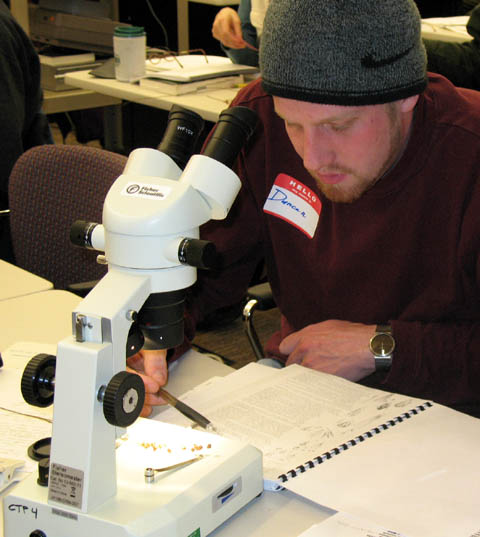
Please sign up for the waitlist if this class is full.
The two-day class will emphasize field character identification of the most common freshwater, estuarine wetland, and associated upland buffer species found in the Puget lowland region of Washington State. The format will be a lecture/laboratory setup. Ample dried material will be available for everyone to practice their keying skills.
Each class will begin with a short lecture covering the terminology and salient morphological characteristics needed for a taxonomic identification of the species of choice, field characteristics, some ecological aspects of the species’ common habitat, commonly associated species, distribution, potential use for restoration purposes, and any special ecological requirements. Lecture materials will include drawings, slides, and dried plant material. The class instruction will be oriented towards the needs of shoreline planners, delineators, OHWM determinations, and restoration ecologists.
(14 CM AICP Credits/CEP Points)
Recommended text: There is a second edition of Hitchcock and Cronquist published in 2018 and edited by David Giblin, Ben Ledger, Peter Zika and Richard Olmstead. That would be preferred if you can get it. If not bring the older version.
Hitchcock, c. 1973. Flora of the Pacific Northwest. University of Washington Press.
If you have or can get a hold of a copy of A Field Guide to the Common Wetland Plants of Western Washington and Northwestern Oregon Sarah Cooke (Ed) 1997. It is out of print but there will be a few copies to share. Much of the material Dr. Cooke discusses is in this book.
Please bring a plant dissecting kit (at least a pair of forceps and dissecting needle).
COVID-19 Considerations: For winter 2022, we request that everyone who participates in this training is fully vaccinated for COVID-19 by the implementation date. You will need to bring your COVID-19 vaccination card or a picture of your vaccination card to the training.
Additionally, all participants will need to complete an online health survey before entering the classroom and we will provide a full refund to anyone who is sick. All participants and instructors will wear masks during the course. All participants will have their own work station with their own microscope. These stations will be at least 6 feet apart. The training room will contain a maximum of 26 students and four instructors or Padilla Bay staff.
Reach out to Sara Brostrom (bros461@ecy.wa.gov) if you have any questions.
Instructor: Dr. Sarah Cooke specializes in wetland creation, restoration and enhancement projects, both in design and implementation. She excels in permitting assistance on the local, state, and national level. She has conducted scientific research on wetland ecosystems for the Puget Sound Wetland and Stormwater Management Manual. Her expertise includes restoration designs, wetland inventories, wetland delineation, OHWM studies, baseline studies, impact assessments, monitoring programs, rare plant surveys, soil surveys, vegetation mapping, and watershed analysis in the region.
